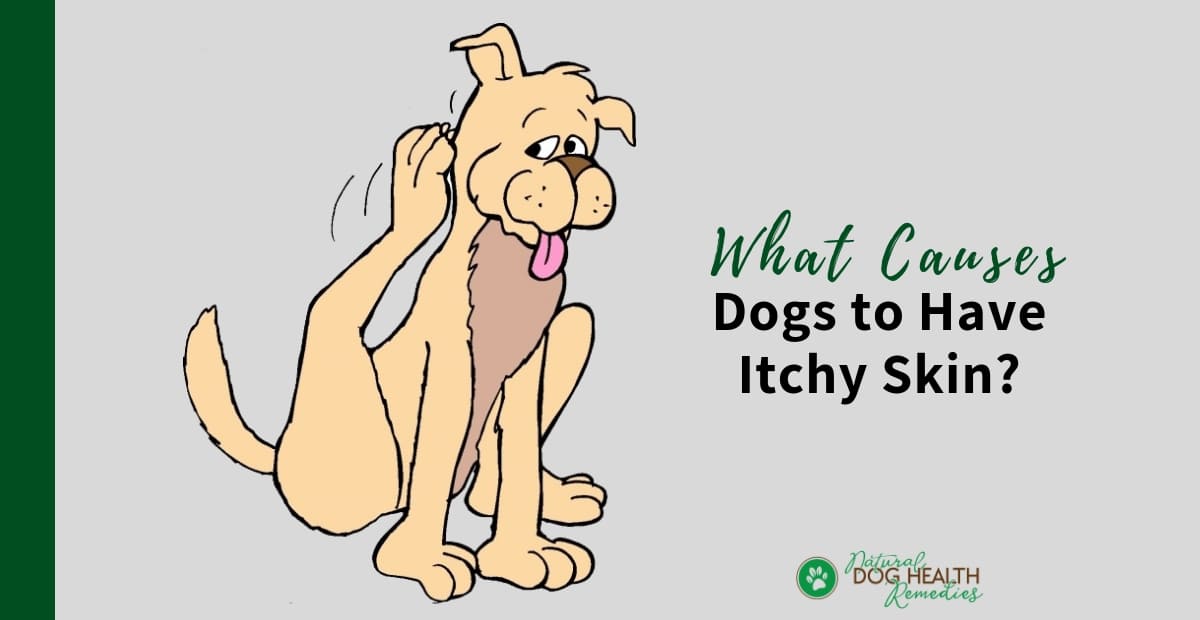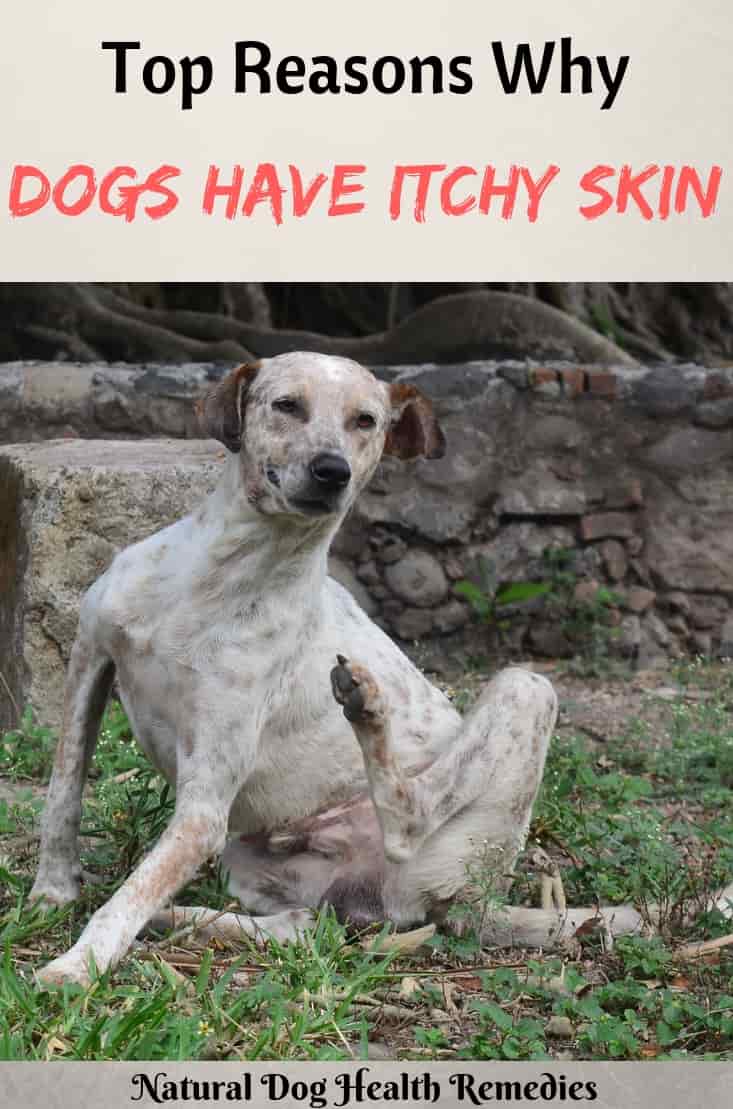Dog Itchy Skin

Overview
I guess one of the most frustrating health issues for dogs is skin irritation that causes intense itching.
It is not difficult to notice that a dog is itching. The signs are obvious:
- The dog is scratching, biting, or even chewing on his skin.
- He is constantly licking and chewing on his paws.
- He often scratches his ears and shakes his head, somtimes vigorously.
- His skin is red, irritated, and inflamed, and his coat looks patchy.
What makes a dog itchy? There are a zillion possibilities. As such, it is sometimes not easy to find out the cause.
However, by grooming and checking your dog daily, by carefully observing your dog's behavior, and by working closely with your vet, it is possible to get to the root problem.
Let's see if we can identify the most common culprits that may cause dog itching.
External Causes of Itchy Skin in Dogs
Basically, the itchy feeling can be from either an external or internal origin. Let's first look at some external causes:
Fleas
Yes - the lowly flea is possibly the first thing that comes to mind when we see an itchy dog.
If you suspect fleas, use a flea comb to check for fleas and flea excrement (tiny black bits that turn red when moistened by a drop of water).
If your dog is itching but you cannot find any fleas on his body, don't rule out fleas yet! Some dogs may develop fleabite allergies that cause a delayed allergic response. It means that your dog may be itching long after he has chewed up and swallowed the dead flea!
To control fleas, please check out this page to see how we can get rid of these annoying bugs in a safe and environmentally-friendly way.
Ticks
Ticks suck the blood of our dogs and can cause intense itching as well! Unlike fleas, ticks do not live permanently on dogs, so it is more difficult to be sure if your dog's itchy skin is caused by ticks.
The best way to check for ticks is to give your dog a massage after an outing to a place where it may be possible for your dog to pick up a tick or two.
Click here for more information on how we can deal with these blood-sucking creatures.Scabies, ear mites
These teeny weeny creatures can cause your dog a lot of agony. They are also hard to spot and can only be detected by examining skin scrapings under the microscope.
Scabies cause intense itching to dogs, usually to all four legs, the ears, and the face. If your dog has this "itch pattern", definitely have your vet do a skin scraping to check for the presence of scabie mites.
Ear mites (Otodectic mite) are another type of mites that cause intense itchiness to our dogs, in particular the ears, and can also cause outer ear infections.
If your dog has ear mites, you will most likely see a lot head shaking and ear scratching. The ears may be swollen and have a bad odor.
Allergies
 A common allergy that affects dogs is flea bite allergic dermatitis.
A common allergy that affects dogs is flea bite allergic dermatitis.
As mentioned above, sometimes a single fleabite can trigger the onset of an allergic reaction if the dog has flea bite allergy. A dog with flea bite allergy usually has itchy spots around his rump and tail. You may even see hair loss in that area if the condition is serious.
Dogs with atopy are allergic to airborne allergens (e.g. pollens, molds, house dust). They also develop itchy skin and particularly itchy feet. You can see a lot of paw licking and chewing if your dog has atopy. Sometimes the dog's face may also be itchy and he may have ear infections as well.
Dogs can also develop itchy skin if they get in contact with something to which they are allergic, such as plants, detergents, pesticides, etc. In these cases, the skin which has come into contact with the irritants will become itchy.
Finally, dogs allergic to their food will also develop itchy skin. A dog with food allergies also tend to lick their feet and sometimes we can see itchiness under the tail and around the anal area.
Eczema
Dogs with eczema has itchy, dry, flaky skin. Eczema can be caused by allergies (e.g. food allergy, airborne allergy), toxicity, over-vaccination, as well as psychological issues.
Seborrhea
Canine seborrhea is another skin problem that causes dog itchy skin. Depending on the type of seborrhea, the skin can be dry or oily. Seborrhea can be caused by allergies, fleas, hormonal disorders, and nutritional disorders.
Hot Spots
Hot spots in dogs can also cause extremely itchy and inflamed skin. Hot spots can occur suddenly and spread quickly, and are caused by allergies, skin parasites (e.g. fleas, mites), insect bites, and so on.
Internal Causes of Dog Itchy Skin
Sometimes, dog itchy skin is a sign indicating that the dog is suffering from some underlying health issues, such as:
- A compromised immune system.
- Other underlying diseases, such as liver disease, systemic yeast infections, hormonal imbalance, and some types of cancer.
- Emotional problems, such as anxiety and stress, depression, or boredom.
Dog Itchy Skin Conventional Treatment
To stop the itching and skin inflammation, the most common conventional medications include:
- Antihistamines (e.g. Benadryl)
- Corticosteroids (e.g. Prednisone)
Sometimes, antibiotics will also be used to treat secondary bacterial skin infections brought on by the dog's constant biting, chewing, and licking.
While corticosteroids usually work fast and bring about relief within 24-48 hours, they of course can cause a lot of nasty side effects.
Also, if we don't address the root cause, the relief can only be temporary. Once the medications are discontinued, the symptoms return.
What's The Alternative?
If you have a dog with an itching problem, it may be a better idea to work with a holistic vet who is willing to get to the root of the problem by careful examination, diagnostic tests and sometimes even repeated trials and errors.
Many holistic veterinarians believe that itching in dogs is a sign - an indication that the dog's immune system is not as good as it should be.
To treat dog itchy skin, therefore, they use a holistic approach to tackle the problem in three ways:
- Alleviate the itch.
- Boost the immune system.
- Treat the underlying root problem.

Natural Itch Relief for Dogs
Visit my article on Natural Itch Relief to take a closer look at this holistic approach. Get information on how to use various natural remedies, such as herbs, vitamins, and fatty acids, to help alleviate dog itching and boost the immune system.
Eldredge, et al. Dog Owner's Home Veterinary Handbook 4th edition (Wiley Publishing, 2007).
C.J. Puotinen, Natural Remedies for Dogs and Cats (Keats Publishing, 1999).
R.H. Pitcairn, The Complete Guide to Natural Health for Dogs and Cats (Rodale, 2005).





